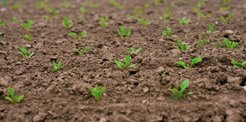Fighting crop losses with microbes
New ERC funding for Max Planck researcher Prof. Dr. Helge Bode on microbial natural products in plant protection
Pathogens and pests are a threat to the cultivation of crops all over the world and lead to considerable losses already at the sowing stage. Existing control measures are based on toxic synthetic chemicals. Helge Bode's research group is tackling this problem with a new funding project to develop sustainable, environmentally friendly biological alternatives for crop protection.

Crops such as wheat, rice, maize, potatoes, and soya form the basis for feeding the world's population. However, already at the seed stage, pathogens and pests such as insects, nematodes, fungi and birds are responsible for losses of up to 30 percent of total production. Although products are available to protect seeds and/or repel pests, these mostly chemicals are often highly toxic and accumulate in the environment. Thus there is an urgent need for more environmentally friendly solutions.
The "Natural Products in Organismic Interactions" research group led by Prof. Dr. Helge Bode at the MPI for Terrestrial Microbiology in Marburg, Germany, has now received a proof-of-concept grant from the European Research Council (ERC) totalling €150,000 to further develop the proposed project over the next 12 months.
In the current ERC Advanced Grant, SYNPEP, the group led by Helge Bode has already studied the production and biosynthesis of metabolites produced by insect-pathogenic bacteria. "Because they live in a complex environment with many interaction partners, these special bacteria are particularly efficient natural product producers," explains Helge Bode. "We have already found highly effective antibiotics in the past.” Within the framework of the ERC Proof of Concept Grant, the team will now seek to optimise the new factors and to further develop them for application. The aim is to produce environmentally friendly and economically viable products that can eventually replace those currently used.












